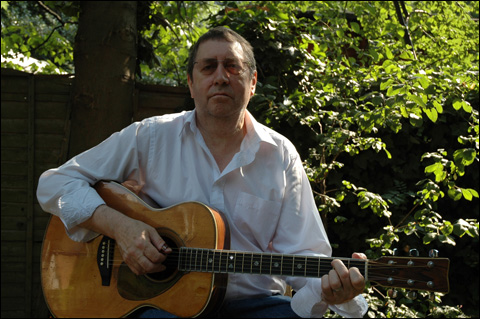
SCOTTISH RITE Jansch has influenced everyone from Jimmy Page and Johnny Marr to Devendra Banhart and Beth Orton. |
There was a time not too long ago when British folk-music titan Bert Jansch would have been remembered mostly as a footnote in pimple-faced Led Zeppelin mythology. Jansch’s 1966 rendition of the traditional Irish folk song “Down by Blackwaterside” was unceremoniously pinched by Jimmy Page and recorded as “Black Mountain Side” on Led Zeppelin’s 1969 debut. In fact, so dominant was Led Zeppelin’s position in the Ahmet Ertegun/Jann Wenner–crafted script of 1970s heaviosity that any influences from Zep’s own European neighborhood were virtually ignored in favor of those more throbbing connections to American blues and rock and roll. The 1970s were, after all, packed into very tight pants.
But heavy riffage notwithstanding, what about the other side to Page’s guitar playing? Those shimmering arpeggios that danced between the raindrops of so many musical styles, from the dexterous picking patterns of country greats like Doc Watson to the terse blues bends of Big Bill Broonzy and even a dash of the vast possibilities of the new jazz cosmology as laid out by composers like Miles and Mingus? Add in the enigma of a thousand years of traditional British folk and you’re getting closer to the heart of Bert Jansch. Yet for the Glasgow-born guitarist, there was never any intention to cast his influence on a long line that includes Donovan, Dylan, Simon & Garfunkel, Led Zeppelin, and even Johnny Marr of the Smiths. The now 67-year-old Jansch — who comes to Johnny D’s tonight (December 9), supported by Pegi Young, wife of Neil — simply put fingers to fretboard, regardless of styles, to see what would happen.
“When you’re a young man, you take in practically everything you hear,” he says from his home in London. “Not learning exactly their technique, but listening to the feel of the music.”
Jansch remembers the early days of British folk as a time when even having a guitar was unusual. Nowadays, a music school sits just around the corner from his residence. “Hordes and hordes of kids walking down the street with their guitars. That’s a new one on me.” In the Glasgow streets of his youth, carrying a guitar brought little promise of anything more than a Sunday diversion. “I never even bothered about performing in front of people. And when I did, I found out I was quite popular.”
Jansch’s humble singing voice and melancholy melodic expressiveness are the calling cards of the 30-plus albums he has recorded, both as a solo artist and with the seminal late-’60s/early-’70s jazz-folk group Pentangle. In contrast to the “We Shall Overcome” attitude and strum-along folk of the corresponding American movement, the UK scene of the 1960s was dark, decadent, complex, and sexy. One listen to Jansch’s 1966 drug song “Needle of Death” should make it clear why he was a major influence on Neil Young. Another heir was the late Nick Drake. “It’s really weird, because he used to do some of my songs. And I was just at the point of wanting to go out and hear him and meet him, and he wasn’t there anymore.”